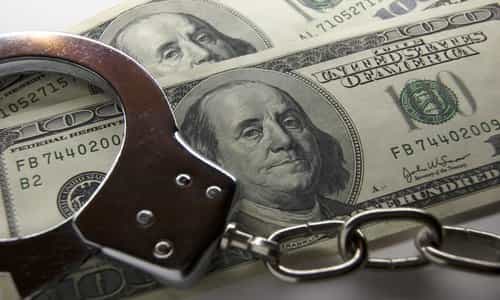Will Banks And Governments Become The New Bonnie And Clyde Of A Cashless Society
 By PNW Staff September 02, 2016
Share this article:
By PNW Staff September 02, 2016
Share this article:
As highwaymen once ambushed travelers to separate the victims from
their cash, so today many such opportunities continue to abound. As bank
vaults once hunkered like mother bears around people's hoards of gold,
now computers labor to a similar function by magnetically holding
records of our economic achievements, waiting to be accessed from
connected terminals anywhere on Earth at any given time.
The destiny of cash may have arrived at
its last logical end. What can we expect when our globally
interdependent economies finally render cash obsolete? Have robbers
truly gone the way of Bonnie and Clyde, or have they become so
sophisticated that they now manifest as banks and governments?
For
the moment, the common folk seem willing to trust their funds to their
banks, internet providers and the politically privileged. Just ask the
Swedes.
But some people think they may be
whistling past the graveyard. Given that governments, and the banks that
fund them, have a dirty little penchant for war and total control over
their subjects, can it be wise to surrender to them your entire means of
exchange?
Whereas some consumers and
industries may find no fault in the evolution to a cashless society,
others raise dire warnings. What do the naysayers predict?
Loss of Privacy
Will
the first lamb sacrificed on the altar of total digital economies be
anonymity? What consumers eat, read, play, worship and even with whom
they associate will be known to the powers that be. At any moment,
certain foods, books, websites, religions and associations could be
declared illegal or so unsavory as to be criminally suspicious.
If
the past predicts the future, then suppliers and those buyers who
prefer to make their own decisions will either be driven out of the
economy, into a prison or underground.
Those
who believe this dystopian future poses no threat to them because, in
their minds, they "have nothing to hide" and entertain full confidence
in their government, may find themselves unpleasantly surprised by
sudden, official disapproval of some aspect of their lifestyle.
Who
could have foretold a future where you would be convicted and confined
for merely wondering if the official body count of the Holocaust were
accurate? Who foresaw that failure to bake wedding cakes for homosexuals
would enable bureaucrats to wipe out your business? Tables do
turn upside down!
Loss of Accounts to Bail-in Theft
Cyprus
2013, the contrarians say, should have been a screaming wake-up call to
anyone with money in the bank. When the Cypriot banks squandered their
assets and lost their solvency, they, and their government conspirators,
skimmed hundreds of thousands of Euros out of private accounts.
For account holders the world over, the
tip of the iceberg has been exposed. Without access to cash, all people,
businesses and organizations will find their money frozen within that
giant, digitally submerged iceberg, unable to flee when they see trouble
coming. In a cashless society, everyone becomes a sheep for shearing.
Chilling of Political Diversity
As
mentioned, when a person's life is exposed as an open book to those in
political control, expressing an unapproved opinion may be as 'safe'
in the West as it is in Red China. Organizing political opposition
could initiate, not tanks in a public square, but condemnation of bank
accounts.
If individuals and groups disfavored
by the elite become known through their purchases, their accounts can
be frozen by a simple command from above. The recent IRS scandal
targeting conservative groups seems to demonstrate that
officially-scorned activity already suffers from Draconian and hostile
oversight.
Unofficial Thieves and Bodily Integrity
So
long as money exists in any form, common thieves will find ways to
abscond with it. Can they be stymied simply because money is reduced to
blips on a server? For all the efforts to thwart hackers, they still
manage, regularly, to crack into cyber safes and make off with
information critical to access financial accounts.
Who
knows how much of their success depends on a little inside help? Maybe a
few, maybe a lot of security penetrations occur with the assistance of
an insider. Even if employees were angels, electronic outlaws continue
to haunt the virtual forest.
Creating security
access that depends on biometrics might add a thin layer of armor to
accounts, but that may only render burglaries and muggings more
gruesome. Without the ability to fling your wallet at assailants, now
they may torture you for your passcodes and account numbers.
If
financial security systems require fingerprints, microchip implants or
iris scans for admittance, what would prevent soulless crooks from
removing said items from your body? Certainly not your firearms, for
those, most likely, must be relinquished before any bank account will be
authorized in a completely cashless society.
Since
the ability to make large purchases without personally delivering a
suitcase full of cash or coin has been a reality for at least a century,
the question arises: qui bono, who benefits, from a cashless society?
Some
futurists wonder if the full implementation of a global cashless
society won't seal the sarcophagus on the ragged remnants of individual
liberty.

No comments:
Post a Comment